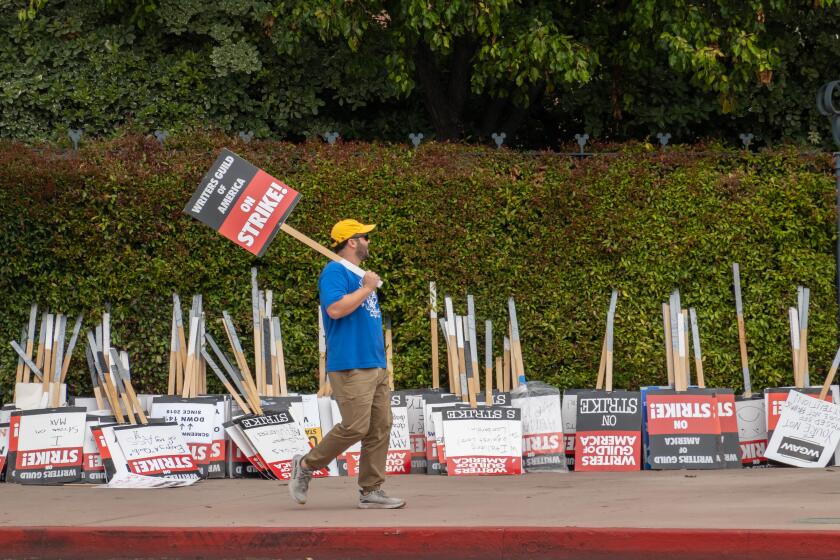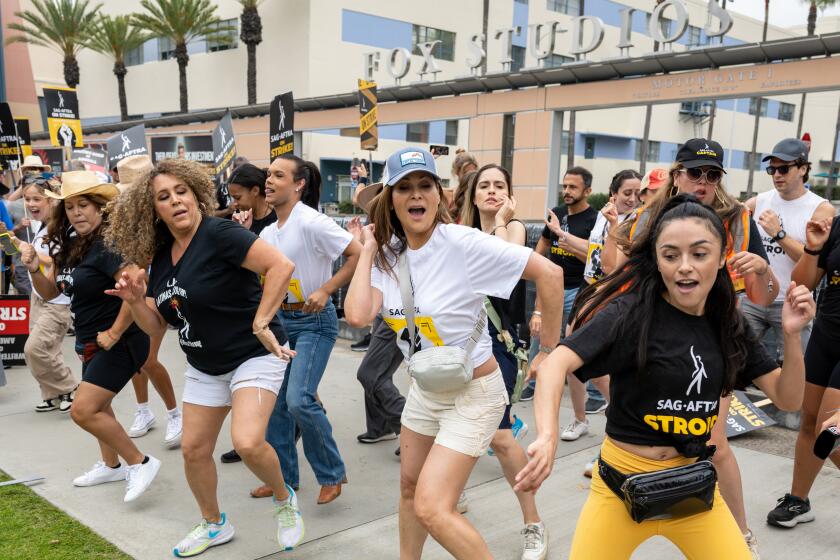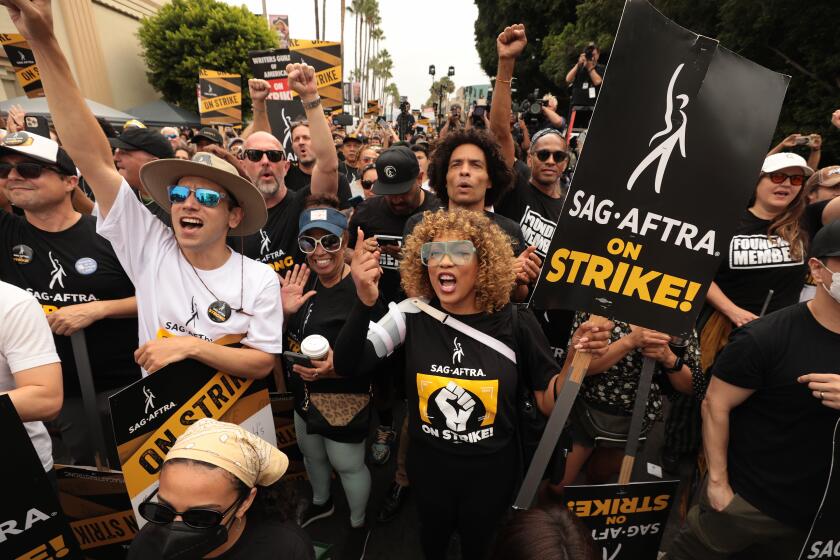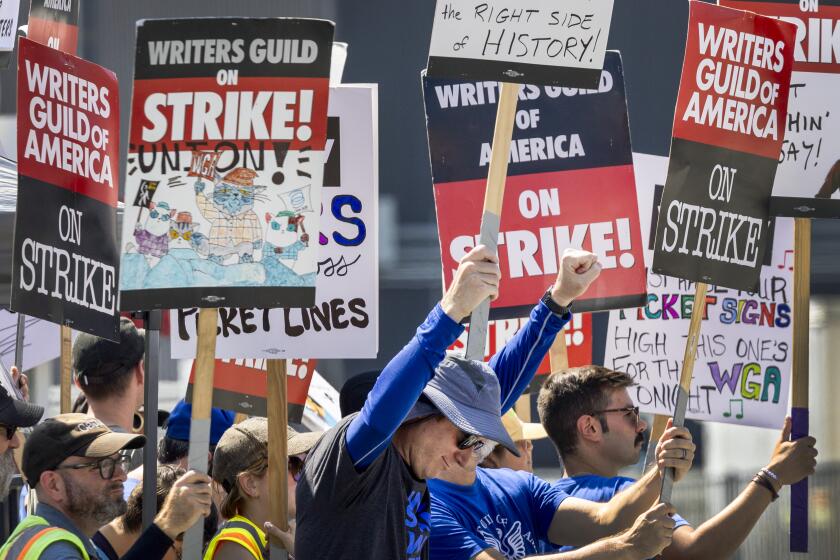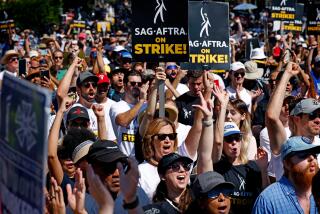Opinion: Here’s where the WGA deal falls short. The striking actors need to do better

After the Writers Guild of America announced a tentative agreement with the studios and declared that their strike was over as of 12:01 a.m. Pacific on Wednesday, guild leadership and others heralded the deal as “transformative.” Writers can go back to work and are expected to ratify the contract in October.
Meanwhile, SAG-AFTRA members remain on strike as the actors have not yet reached an agreement with the studios. Their leadership congratulated their “union siblings” at WGA on the deal. Sure enough, by some metrics the WGA won a lot: a wide variety of increases in compensation and benefits as well as minimum staffing requirements for TV writers’ rooms and some protections around AI.
Even contracts that win over the most skeptical writers and actors won’t be able to fix some of the biggest fractures facing the industry today.
Yet this deal is not as transformative as it should be. Streaming is where the entertainment industry has gone and continues to see growth. That is where the money is, but the current payment system doesn’t reflect that. Thus the core of the WGA agreement should be about streaming residuals. The union had a historic opportunity — particularly because its strike was paired with SAG-AFTRA’s — to completely revamp those residuals and turn screenwriting into a long-term, sustainable profession again.
Instead, the WGA got viewership-based streaming bonuses and some amount of data sharing. In effect it gave up on getting more money for writers from shows that perform well in exchange for minimum transparency from streaming services on viewership.
Look at the contract language around data sharing by the streamers: “Companies agree to provide the Guild, subject to a confidentiality agreement, the total number of hours streamed, both domestically and internationally, of self-produced high budget streaming programs (e.g., a Netflix original series). Aggregated information can be shared.”
Some actors are subjected to full body scans. Screenwriters worry about their work being digitally repurposed. Those striking against the studios rightly demand stricter controls over artificial intelligence.
This isn’t using data on hours streamed and giving residuals based on it, as the WGA initially proposed. It’s providing data on hours streamed and — doing nothing with it. The contract does create bonuses for high viewership, but only for productions that clear a huge hurdle: They have to be viewed by 20% or more of the service’s domestic subscribers in the first 90 days of release (or in the first 90 days of what the contract calls “any subsequent exhibition year”). One-time bonuses are not residuals, and think of all the shows that get millions of viewers but just don’t make that threshold; those writers get nothing for their success.
The guild may have settled for this exchange thinking that in the next cycle they could argue for more. But the fight is not the next cycle. The fight — and the leverage — is now.
So where does this leave SAG-AFTRA? The actors’ union has proposed increases in minimum pay rates, improved working conditions — and getting 2% of revenue generated by streaming shows.
SAG-AFTRA has been negotiating its video game contract, or Interactive Media Agreement, for nearly a year. The authorization vote doesn’t initiate a strike.
Actors are on strike because most of us struggle to stay alive in this profession. I’ve been in SAG-AFTRA for nearly 15 years and have never made enough money to qualify for union health insurance. I’ve come close — once. I am not famous or ever had my own show, but I have worked. My credits include ABC’s “Jimmy Kimmel Live!” and “Rebel,” FXX’s “You’re the Worst,” HBO’s “The Newsroom,” Hulu’s “Difficult People,” Netflix’s “Mascots,” Nickelodeon’s “Bella and the Bulldogs” and Paramount+’s “Players,” along with a number of digital projects for Adult Swim, Disney, Facebook Watch, Funny or Die and Snap.
Those are the credits of a working actor. Yet I’ve never made the $26,470 in a year — an unlivable wage in L.A. — that is required to get guild health insurance.
What this fight should be about is allowing working actors the chance to earn a livable wage with reasonable health coverage. Reasonable residuals have to be part of that.
At a moment when the prospect of executives and managers using software automation to undermine work in professions everywhere loomed large, the WGA strike took on major symbolic weight.
In April, NBA players negotiated a collective bargaining agreement that netted them 49%-51% of basketball-related income, which encompasses ticket sales, TV rights and concessions. Much as the NBA can’t play games without LeBron James, Steph Curry, Nikola Jokic and all its other athletes, the studios can’t make movies and TV shows without Meryl Streep, Tom Hanks, Denzel Washington and the 160,000 other actors in SAG-AFTRA.
Are we asking for 51%? No, we’re asking for 2%. The WGA, for all its other wins, got 0%. SAG-AFTRA still has time to do better.
Nelson Cheng has been a member of SAG-AFTRA since 2010 and has worked for Amazon and Google.
More to Read
A cure for the common opinion
Get thought-provoking perspectives with our weekly newsletter.
You may occasionally receive promotional content from the Los Angeles Times.
